Denver Colorado Wildlife Lawyers Blog
Get off the Hook and Have Your Hunting and Fishing Rights Reinstated with a Strong Appeal


In August 2012, state Rep. Jon Becker’s House Bill 1330 was signed into law creating an appeals process for Coloradans with suspended hunting or fishing licenses. This law gives hunters and anglers in Colorado a hearing and an appeals process for suspended licenses and allows a way and means for these individuals to continue to pursue their passion.
The Wildlife Attorneys at Welsh Law, LLC work with many clients to reinstate fishing and hunting rights in Colorado, and specifically between Julia Stancil and myself, we have handled hundreds of wildlife cases throughout the county. For example, in December of 2014, Wildlife Attorney Julia Stancil went before the Colorado Parks and Wildlife Commission to petition for a reinstatement of her client’s rights to hunt and fish in Colorado and all other states within the Interstate Wildlife Compact. Her client had received a decades-long suspension of hunting and fishing privileges after accumulating a series of tickets as a youth. The time limit to appeal such a suspension is thirty (30) days following an administrative decision, but unfortunately, the client had not retained legal counsel at the time and did not appeal. Without the right to appeal the decision, Ms. Stancil filed a Petition for Declaratory Order. This is essentially a petition for equitable relief that was based upon an argument that the client should not have received such a lengthy suspension based upon the statutes violated at the time. This unique argument prevailed and Ms. Stancil’s client immediately had their rights reinstated.
In the alternative, we also work to avoid the suspension altogether. Recently, I represented a client who was facing both federal and state charges for illegal possession of wildlife, with a potential of 35pts against the client’s hunting privileges. After our investigation and multiple plea discussions, I was able to negotiate a plea deal in which the state agreed not to pursue state charges, and to include a $10,000.00 Sampson charge. The federal prosecutors agreed to dismiss one of the two federal charges, which would limit the violation to 15pts, thereby avoiding the suspension hearing altogether and allowing our client to retain his privilege to hunt.
An appeal to the Commission is a difficult and challenging process that requires competent and knowledgeable representation. Here are three tips for you to build a strong case to get your rights reinstated:
- Hire legal counsel to create an appellate battle plan. This is not the time for you to represent yourself in court: join forces with a reputable law firm and begin preparing your appellate battle plan. Your legal representatives will start by preparing a thorough written analysis of the legal theories at issue in your case, which will include the elements of each cause of action and defense you plan to allege and of those you anticipate your opponent will raise.
- Begin building the record. If it’s not in the record, it didn’t happen. There is nothing more important to an appeal than ensuring that there is an adequate record to present to the appellate board. The hearing record, written and documentary evidence, along with certain mitigating documents are what the commission uses when considering the appeal. A transcript of the hearing is mandatory. Our wildlife attorneys utilize Transcription Outsourcing, LLC to record accurate transcripts of witness interviews and appeal hearings regarding cases on hunting privileges. These transcripts result in a much stronger case to present to the Colorado Parks and Wildlife Commission.
- Make good objections and get a ruling. Here are the worst words you can hear from an appellate court or commission: “Great argument; not preserved.” To preserve the issue for appeal, you need to raise an objection, seek a remedy and secure a ruling. Make sure the trial record accurately reflects timely, meaningful objections, made on clearly stated grounds and is followed by a ruling by the court (or a clear request to rule).
If you have received a summons for a wildlife violation or have been given a notice of a hearing by the Division of Parks and Wildlife, contact the experienced Wildlife Attorneys at Welsh Law, LLC for a consultation. One of our attorneys can advise you, represent you for your wildlife violation at the court level both state and federal, argue the case at the hearing level to attempt to prevent or mitigate a suspension, and can also appeal a decision that is made by the hearings examiner.
BLM Transfer
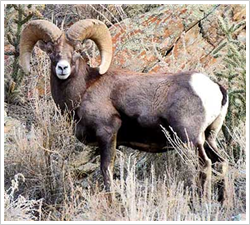

Recreational permits for BLM or State-owned land are vital for some outfitters in Colorado. When it comes time to sell your outfitting business or acquire another outfitter’s company, it is imperative that this permit is handled correctly.
BLM permits can be transferred to a new business owner, but cannot be done so without the BLM’s approval. Forms for transfer must be submitted and approved by a BLM officer before your permit is given to the buyer of your outfitting business.
The BLM may require additional documents from you regarding the sale. An attorney with Wildlife Lawyers will help you draft those documents to ensure your permit is transferred safely. The loss of a permit for recreational use can greatly affect the transfer of a business and every care should be taken to avoid it. Talk to an experienced attorney who understands the outdoor business world and can help protect you and your business.
Attorney Stancil Wins Reinstatement of Client’s Hunting/Fishing Rights
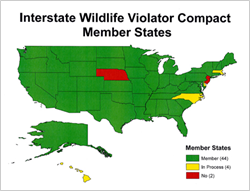

In December of 2014, Wildlife Attorney Julia Stancil went before the Colorado Wildlife Commission to petition for a reinstatement of her client’s rights to hunt and fish in Colorado and all other states within the Interstate Wildlife Compact. Her client had received a decades-long suspension of hunting and fishing privileges after accumulating a series of tickets as a youth. The time limit to appeal such a suspension is thirty (30) days following an administrative decision, but unfortunately, the client had not retained legal counsel at the time and did not appeal. Without the right to appeal the decision, Ms. Stancil filed a Petition for Declaratory Order. This is essentially a petition for equitable relief that was based upon an argument that the client should not have received such a lengthy suspension based upon the statutes violated at the time. This unique argument prevailed and Ms. Stancil’s client immediately had their rights reinstated.
If you have been given a notice of a hearing by the Division of Wildlife, contact the experienced Wildlife Attorneys at Welsh Law, LLC. One of our attorneys can advise you, argue the case at the hearing level to attempt to prevent or mitigate a suspension, and can also appeal a decision that is made by the hearings examiner.
The Legalities of “Walkie Talkie” Use While Hunting
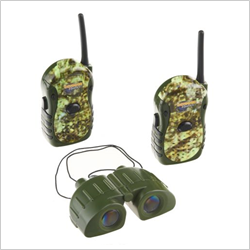

Several clients have asked about the legality of "walkie-talkie" use or use of other electronic devices while hunting. For example, an elk hunter asked me if he would be violating Colorado’s wildlife laws if he and his son used "walkie-talkie’s" to communicate their locations while hunting on opposite sides of a creek. Of course, the hunter’s concern was safety while hunting and my answer was that this would not be an illegal use of an electronic device.
The statute he was referring to was C.R.S. 33-6-124(3), which states as follows: "it is unlawful for two or more people on the ground, in a motor vehicle, or in a vessel to use electronic devices to communicate information in the furtherance of a violation of Articles 1 to 6 of this title or of a commission rule. A person who violates this subsection (3) is guilty of a misdemeanor, and upon conviction thereof, shall be punished by a fine of two hundred dollars and an assessment of 15 license suspension points." Of note, if a person accumulates 20 suspension points over a period of five consecutive years, the commission may suspend their license to hunt and fish for up to five years.
It would not be illegal for hunters to use "walkie-talkies" to communicate their locations. It is not illegal for an individual to advise another that "there is a herd of elk coming your way." While not illegal to advise on the locations of animals per se, some people feel this conduct is not ethical for a hunter under the principles of fair chase and fair play. An example of something unlawful would be to advise another "there is a herd of elk coming your way – shoot one for me!." Another example of unlawful use of walkie-talkies would be if a hunter shoots an elk over bait and then uses a walkie-talkie to communicate his location to his hunting partner for assistance in field dressing the animal. In this example, but the hunter who shot the elk over bait, and the hunter who assisted in field dressing would be in violation of various statutes.
As always, hunters should review the current laws on a yearly basis as these laws change. If you have been cited for a violation of any wildlife law, or have a question on the laws, please contact an experienced attorney from Wildlife Lawyers.
Elephant Ivory Case Moving Forward
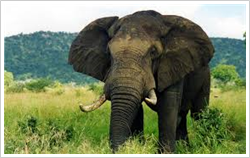

Hunters going on exotic hunting safaris will be interested to know when they may once again hunt certain countries in Africa for elephants. Currently, the Safari Club International, as well as the National Rifle Association, have filed suit against the Department of Interior regarding their suspension of the importation of elephant trophies of sport-hunted elephants from Tanzania and Zimbabwe in 2014.
In a memorandum opinion issued last month, the United States District Court, District of Columbia granted the Department’s motion to dismiss the Tanzania claims but denied the motion to dismiss the Zimbabwe claims. Still, the plaintiffs have been allowed time to refile an amended complaint.
The road ahead is a long one, but these organizations have chosen to fight the battle for hunters looking to hunt elephants in Africa and import the ivory trophy back to the United States legally. Even in the countries where harvested animals may be exported to the US legally, several rules and regulations from treaties and statutes apply and the hunter must be careful to abide by those guidelines. An attorney at Wildlife Lawyers can help to ensure your exotic trophy is not confiscated or destroyed. If you are planning an African or other exotic safari hunt and want an experienced attorney to assist with the permitting process, call Wildlife Lawyers.
Colorado Big Game Winding Down, Waterfowl Ramping Up
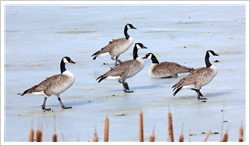

With most big game seasons ending, the waterfowl season in Colorado is ramping up for January. Rifle Plains Deer season will go through January, but most of the deer, elk, and pronghorn seasons have come and gone. Many big game hunters will turn instead to dark geese, ducks, and eventually snow geese.
Colorado hosts a large number of capable outfitters for those hunters who don’t feel like messing with a large decoy spread and finding a spot to hunt away from the public crowds. For a modest fee, outdoorsmen and women can sit in comfortable blinds and focus on camaraderie and socializing and let their guide worry about decoys and calling.
Public ground in Colorado can be at a premium in January when most of the lakes have frozen. The few public areas with open water on rivers or sloughs will see a lot of foot traffic from Colorado duck and goose hunters. Public land hunters will benefit from extensive scouting and long hikes with their gear.
As with any hunting season, it’s important to know what you and your hunting companions are required to carry. Colorado Parks and Wildlife Officers will be checking waterfowl hunters for proper licenses and equipment through the end of the season. If you receive a ticket, it is vital to talk to a Wildlife Lawyer to learn your options. One of our experts in our Wildlife Law group will walk you through the options you have — we are here to help you.
A Big Loss For Hunters
On Monday, December 8th, the Appellate Court in Illinois reversed the conviction of two individuals for "willful obstruction or interference with the lawful taking of wild animals under section 2(a) of the Hunter and Fishermen Interference Prohibition Act (Act) (720 ILCS 125/2(a)" People v. Holm, 2014 IL App (3d) 130582.
Adam and Daniel Holm, followed two deer hunters (one who happened to be a conservation officer for the state and arrested the pair on the spot for hunter harassment; kudos to him) on private property making excessive noise including whistling, clapping, laughing, revving their ATV’s and throwing gravel, and shaking tin cans with rocks inside. The Holms did this with the intent to drive away deer that the deer hunters were pursuing legally on their own private property. The Holms were convicted at trial level and fined $175 (a laughable sentence in itself considering the steep fines faced by hunters for honest mistakes in the field, but a discussion for another day).
The Appellate Court reversed their conviction because the Holms apparently stayed on their side of the property boundary and harassed the hunters from their own private property. The Court found this to be a permissive enjoyment of their own private property. Even though, their entire intent was to disturb the hunting efforts of their neighbors who were legally hunting deer on their own private property.
Doesn’t it follow that the permissive use of your own private property ends when that use interferes with your neighbor’s use and enjoyment of his or her own property? Why would the court not take into account the effect of a particular use on the properties nearby? The Court’s decision here not only affects hunters whose neighbors may have some interest in disturbing the hunting efforts next door, but to landowners in general. Most states, including Kansas, Colorado, and Missouri have laws in place such as this to protect hunters from harassment but we can only hope the reasoning here is not extended to those states.
Kansas Rifle Deer Season Winds Down
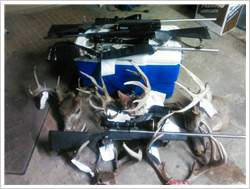

With Rifle deer season winding down this past weekend, wardens were very busy in Kansas. Several hunters from both in and out of state were charged with violations ranging from criminal trespass to aggravated assault to no hunting license.
Hunting violations are very serious and can affect every aspect of your life. At Wildlife Lawyers, we have a dedicated team of attorneys to assist you with the judicial process. We’ll be there every step of the way making sure your voice is heard and your rights are preserved.
If you received a Kansas Deer Hunting Violation this year, call one of our Wildlife Lawyers today and talk with them about your options. We specialize in representing hunters, and our attorneys licensed in various states, including Kansas, will be your best ally in the process.
Hunter Loses Elk After Reality TV Star Officer Issues Violation for the Cameras
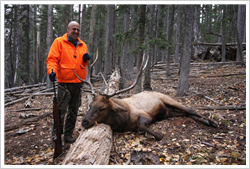

A Minnesota hunter enjoying the elk season in Montana was issued a citation this season for "failure to properly tag" the elk he killed. According to reports, Jim Latvala harvested a beautiful bull elk in the early hours of the morning at first light. He and his brother then had to wade through a swamp to reach the animal. Upon reaching their bull, the pair were elated and took a moment to survey the area, appreciate the animal, and let the joy of a successful hunt wash over them.
Then the Reality TV Cameras came. A Montana Fish and Wildlife Officer, Drew Scott, approached the pair while being followed by TV Cameras for the show "Wardens." According to him, because the hunters had taken "20 minutes" before tagging the bull, he not only had to issue the shooter a citation but also confiscate the entire bull, antlers, and all.
According to Joe Knarr, the Warden Sergeant for the area the incident occurred in, "If you read the statute, it says you must immediately validate the tag." No time for joy or elation here. No high fives, handshakes, or pats on the back. No allowing for a quiet moment with the animal out of respect for him and the tradition of hunting. Apparently, the best kind of hunter in Montana is a bureaucrat who approaches with folders of paperwork and no feelings whatsoever.
If you are ever issued a citation while hunting, whether for a hunting-related crime or not, it is imperative that you retain counsel to help you through the judicial process. Citations like the one issued here should be taken very seriously and defended with the utmost effort. An attorney at Wildlife Lawyers can help answer your questions and counsel you about any violations you may have received.
Kansas Big Game Violations
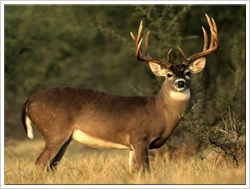

Rifle deer season is more popular than ever in Kansas, with the season getting underway this week. Hunters can expect to see several others in pursuit of deer this weekend and should be mindful of the laws applying to white-tailed and mule deer in Kansas.
If you receive a ticket while deer hunting in Kansas, hunters should know that a conviction or guilty plea to their first violation in Kansas could lead to fines between $500-$1,000 or six months in the county jail. In addition, if the animal harvested is a trophy, special fines apply. A white-tailed deer with an inside spread measurement of greater than 16 inches or a mule deer with an inside spread of greater than 20 inches, will earn the violator an additional $5,000 fine. (Kan. Stat. Ann. § 32-1032).
Depending on the size of the deer taken, restitution may be ordered paid to the State for the value of the deer. Based on a formula derived from the size of the antlered animal, the hunter could be facing even more additional fines.
Finally, even your first guilty plea or conviction of a hunting violation in Kansas can lead to a one-year suspension of all hunting privileges. Hunters facing their second or third can lose their privileges for up to 5 years.
If you are accused of illegally hunting deer in Kansas, it is vital that you contact a Wildlife Lawyer to represent you. You have rights when it comes to the judicial process and a Wildlife Lawyer licensed in Kansas can help you. A qualified attorney with our office will be on your side and fight for your best interests, as neither the judge, prosecutor, or game warden can do so. Before paying any fines or taking any plea offers, consult with one of our Wildlife Lawyers.
